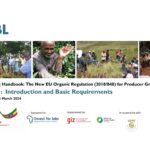
12 downloads
Title of document: Training Handbook: The New EU Organic Regulation (2018/848) for Producer Groups Authors/editor: Florentine Meinshausen (FiBL), Marlene Rudolph (Naturland), Toralf Richter (FiBL), Brian Ssebunya (Uganda), Abdi Itana (Ethiopia) Journal’s name if any: Ministry/Government Agency/Organization: EU Year of publication: 2024 Geographic focus: Main issues/ topics addressed (for example: Handbook…) School of agroecology (if any): Web address to original document (if any): https://www.fibl.org/en/shop-en/1270-eu-organic-regulation Summary: The training handbook was developed for organic producer groups to understand and apply the requirements of the new EU Organic Regulation. It represents FiBL’s status of understanding of the new EU regulatory requirements as per March 2024. Read More
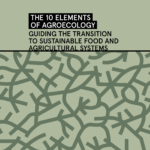
10 downloads
Title of document: The 10 Elements of Agroecology: Guiding the transition to sustainable food and agricultural systems Authors/editor: FAO Journal’s name if any: Ministry/Government Agency/Organization: FAO Year of publication: 2018 Geographic focus: Global Main issues/ topics addressed (for example:) School of agroecology (if any): Web address to original document (if any): Summary: Today’s food and agricultural systems have succeeded in supplying large volumes of food to global markets. However, high-external input, resource-intensive agricultural systems have caused massive deforestation, water scarcities, biodiversity loss, soil depletion and high levels of greenhouse gas emissions. Despite significant progress in recent times, hunger and extreme poverty persist as critical global challenges. Even where poverty has been reduced, pervasive inequalities remain, hindering poverty eradication. Integral to FAO’s Common Vision for Sustainable Food and Agriculture, agroecology is a key part of the global response to this climate of instability, offering a unique approach to meeting significant increases in our food needs of the future while ensuring no one is left behind. Agroecology is an integrated approach that simultaneously applies ecological and social concepts and principles to the design and management of food and agricultural systems. It seeks to optimize the interactions between plants, animals, humans and the environment while taking into consideration the social aspects that need to be addressed for a sustainable and fair food system. Agroecology is not a new invention. It can be identified in scientific literature since the 1920s, and has found expression in family farmers’ practices, in grassroots social movements for sustainability and the public policies of various countries around the world. More recently, agroecology has entered the discourse of international and UN institutions. Read More
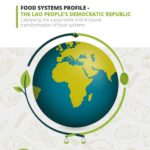
38 downloads
Title of document: Food Systems Profile - The Lao People’s Democratic Republic The following people have contributed to this assessment and the writing of this note: Sayvisene Boulom, Thongdeuane Nanthanavone (National Consultants); Stéphane Guéneau (CIRAD), Meeta Punjabi Mehta (CFID, FAO), Pooja Khosla (CFIB, FAO), Maria Antonia Tuazon (FAO), Isabelle Vagneron (CIRAD) Leyla Werleigh (FAO, Lao PDR) , James Tefft (CFID, FAO). Editing and formatting: Alan Cooper, Saon Bhattacharya, Chiara Journal’s name if any: Ministry/Government Agency/Organization: FAO, EU, CIRAD, MAF Year of publication: 2022 Geographic focus: Lao PDR Main issues/ topics addressed (for example: …) School of agroecology (if any): Web address to original document (if any): Summary: This brief is the result of a collaboration between the Ministry of Agriculture and Forestry, the Lao People’s Democratic Republic, the Food and Agriculture Organization of the United Nations (FAO), CIRAD, and the European Union, in close consultation with national and international experts. It was implemented in the Lao People’s Democratic Republic from June to September 2021. The methodology used for preparing this brief is the result of a global initiative of the European Union, FAO, and CIRAD to support the sustainable and inclusive transformation of food systems. This assessment methodology is described in detail in the joint publication entitled, Catalysing the sustainable and inclusive transformation of food systems: conceptual framework and method for national and territorial assessment... Read More
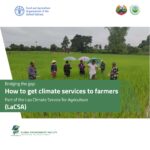
26 downloads
Title of document: Bridging the gap: How to get climate services to farmers Authors/editor: FAO, MONRE, MAF Journal’s name if any: Ministry/Government Agency/Organization: FAO, MONRE, MAF Year of publication: 2021 Geographic focus: Lao PDR Main issues/ topics addressed (for example: …) School of agroecology (if any): Web address to original document (if any): Summary: The Lao Climate Service for Agriculture (LaCSA) provides agro-meteorological information in a compact format relevant to Lao farmers. The challenge addressed here, is the delivery of the provided information to farmers and other end-users. While the standard output channel are bulletins that are published online and sent to subscribed receivers, these resources may be beyond the reach of many farmers. Under the SAMIS project, FAO in collaboration with the Department of Meteorology and Hydrology (DMH) and the Department of Agriculture and Land Management (DALaM), have tested a number of pathways to give farmers access to the produced content. Based on their testing, a number of ways have been identified that allow farmers to take advantage of tools that are normally out of their reach. To drive this process, the National Agriculture and Forestry Institute (NAFRI) has trained DAFO and DONRE staff throughout the country in the use and retrieval of LaCSA information. The purpose of this leaflet is to present the identified dissemination options and insights, to encourage subsequent projects in taking them up or building on them. Read More
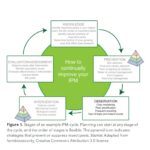
27 downloads
Title of document: Insect Pest Management Authors/editor: Annie Deutsch and Stacy Swartz Journal’s name if any: Ministry/Government Agency/Organization: EDN Year of publication: 2021 Geographic focus: Asia Main issues/ topics addressed (for example: …) School of agroecology (if any): Web address to original document (if any): http://edn.link/ipm2 Summary: Insect pests affect all forms of agricultural production, from densely planted field crops to high-value nursery plants to grains in storage. This article explains some principles and practices for conducting in-field observations (sampling) to inform pest management decisions. General principles and practices are discussed for detecting, identifying, and monitoring pest populations, in order to inform next steps. Read More
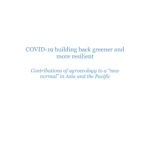
10 downloads
Title of document: COVID-19 building back greener and more resilient: Contributions of agroecology to a “new normal” in Asia and the Pacific Authors/editor: FAO Journal’s name if any: Ministry/Government Agency/Organization: FAO Year of publication: 2021 Geographic focus: SEA Main issues/ topics addressed (for example:…) School of agroecology (if any): Web address to original document (if any): http://www.fao.org/documents/card/en/c/cb3114en Summary: Besides the severe health crisis, the COVID-19 epidemic also caused the global economy to contract at a rate not seen since the Second World War and led to a severe increase of poor and food insecure people as well as a sharp projected decrease of production of agricultural goods in Southeast Asia. The effects of the pandemic on agriculture have been exacerbated by the way in which the current industrial farming system is set up. Integral to Food and Agriculture Organization’s (FAO) common vision for sustainable food and agriculture, agroecology echoes the goals of the 2030 Agenda and can be seen as a key part of the global response to this climate of instability, offering an original approach to meeting significant increases in our food needs of the future while ensuring no one is left behind. As recognized by the World Bank and FAO-led global agriculture assessment (IAASTD 2019), landmark reports from IPBES (2018; 2019), IPCC (2019), and FAO (2019a), agroecology has the capacity to reconcile the economic, environmental, and social dimensions of sustainability. This paper is a contribution to the regional dialogue on how to respond to the COVID19 crisis. It first highlights some of the impacts of the pandemic on agriculture and food security in the Asia Pacific Region. Then, mobilizing the FAO’s 10 elements of Agroecology framework, it provides selected examples of how agroecological approaches can contribute transforming food systems and developing a greener, more resilient and more inclusive “new normal” Read More
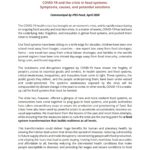
3 downloads
Title of document: COVID-19 and the crisis in food systems: Symptoms, causes, and potential solutions Authors/editor: IPES-Food Journal’s name if any: Ministry/Government Agency/Organisation: IPES-Food Year of publication: 2020 Geographic focus: Global level Main issues/ topics addressed (for example: …) School of agroecology (if any): Web address to original document (if any): Summary: The COVID-19 health crisis has brought on an economic crisis, and is rapidly exacerbating an ongoing food security and nutrition crisis. In a matter of weeks, COVID-19 has laid bare the underlying risks, fragilities, and inequities in global food systems, and pushed them close to breaking point. Our food systems have been sitting on a knife-edge for decades: children have been one school meal away from hunger; countries – one export ban away from food shortages; farms – one travel ban away from critical labour shortages; and families in the world’s poorest regions have been one missed day-wage away from food insecurity, untenable living costs, and forced migration… Read More
11 downloads
Title of document: Agroecology in times of COVID-19 Authors/editor: Miguel A Altieri and Clara Ines Nicholls Journal’s name if any: Ministry/Government Agency/Organisation: University of California, Berkeley and Centro Latinoamericano de Investigaciones Agroecológicas (CELIA) Year of publication: 2020 Geographic focus: Global level Main issues/ topics addressed (for example: …) School of agroecology (if any): Web address to original document (if any): http://celia.agroeco.org/ Summary: Most of our global problems: energy shortages, water scarcity, environmental degradation, climate change, economic inequality, food insecurity and others cannot be addressed in isolation, as these problems are interconnected and interdependent. When one of the problems is aggravated, the effects spread throughout the system, exacerbating the other problems. Like never before, the systemic nature of our world has been revealed to us by the coronavirus pandemic: human, animal and ecological health are closely linked. Is this one of the lessons that COVID -19 is here to teach us? Regardless, the pandemic is undoubtedly a wakeup call to humanity to rethink our capitalist, highly consuming mode of development and the ways we relate to nature. The times we live, demand a holistic response to the crisis, one that addresses the root causes behind the now obvious socioecological vulnerability and fragility of our globalized world… Read More
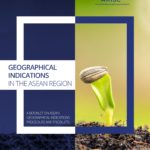
19 downloads
Title of document: Geographical Indications in the ASEAN Region Authors/editor: ARISE+ IPR Journal’s name if any: Ministry/Government Agency/Organisation: ARISE+ IPR, EU Year of publication: 2019 Geographic focus: South East Asia Main issues/ topics addressed (for example: overview about geographical indications in the ASEAN region; geographical indications protection in each ASEAN member state; protection of geographical indications in the European Union and international markets…) School of agroecology (if any): Web address to original document (if any): Summary: A booklet on ASEAN Geographical Indications procedure and products The ARISE Plus Intellectual Property Rights (ARISE+ IPR) programme is one of the components under the Enhanced ASEAN Regional Integration Support from the European Union (EU)The overall objective of ACTAE project is to build durable and effective mechanisms to facilitate synergies among initiatives contributing to an agro-ecological transition in South East Asia. ARISE+ IPR programme supports regional integration through Intellectual Property (IP) cooperation and aims to upgrade the IP systems for creation, protection, utilisation, administration and enforcement, in line with international best practices and standards and the strategic objectives of the ASEAN Intellectual Property Rights Action Plan 2016-2025. Read More
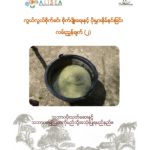
62 downloads
Title of document: Pest Control guideline #2 for Easy Gardens Booklet (Version Burmese) Authors/editor: Partners Myanmar Journal’s name if any: Ministry/Government Agency/Organisation: Partners Myanmar Year of publication: 2018 Geographic focus: Myanmar Main issues/ topics addressed (for example:…) School of agroecology (if any): Web address to original document (if any): Summary: Document of ALiSEA Small Grant Facility in Myanmar. Read More

 Asia & Mekong Region
Asia & Mekong Region  Cambodia
Cambodia  Laos
Laos  Myanmar
Myanmar  Other
Other  Vietnam
Vietnam